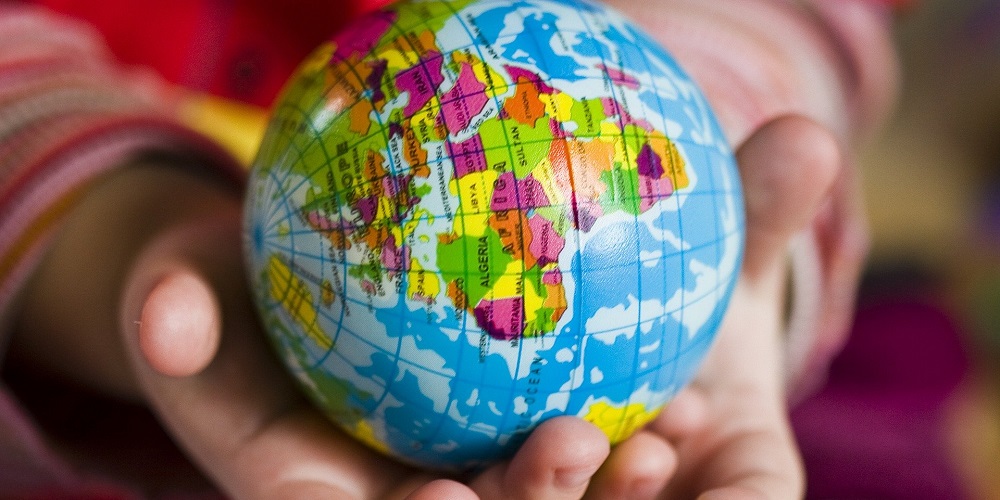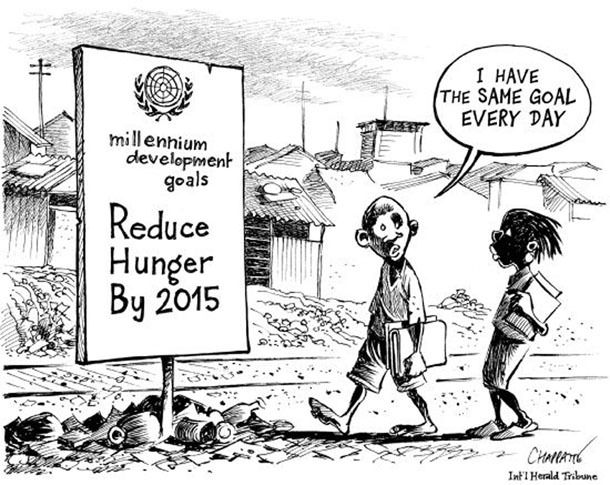
What do you think is at the core of the human development concept?
There is a Patrick Chappatte cartoon from 2015 in which two young people are walking past a big billboard, which has the goals that preceded the current Sustainable Development Goals (SDGs) on it. One of these young people turns to the other and says: “I have the same goals every day”. That, for me, is what human development is about. The SDGs are not perfect, but they are the best plan we have ever had: it is the most widely consulted and I think a lot of the goals reflect people’s objectives in their everyday lives. Human development is about taking these goals on the billboard and figuring out what they look like in those two young people’s lives. Paradoxically, I think a lot of the SDG initiatives are still on the billboard and not on the ground. The indicators in the reports are still relatively macro and materialistic rather than aspirational, and they do not necessarily inform us about what really makes a difference for people in everyday life. That is where I think human development comes in.

The other key issue that arises with the SDGs is that they often conflict with each other. Looking at COVID-19, it is clear that everybody wants a sustainable livelihood and sustainable health, but if they go to work to follow this livelihood, they may get sick (with COVID-19). There is a need to figure out how to balance these goals. We have a dilemma going on between lives ‘or’ livelihoods, and balancing that is not going to be easy in everyday life.
I think ultimately that the path to a better balance between the SDGs and a better understanding of what they mean for people in everyday life lies in asking people directly. The work that I/we conduct is on sustainable livelihoods and it is often about asking people to chart what aspects of their daily livelihood work for them, in everyday working life.
Do you think the different indices that we have today (Human Development Index, Multidimensional Poverty Index, Happiness and Wellbeing Indices) can complement the indicators of the SDGs?
I really like the idea behind the HDI and the MPI, of going beyond the purely economic aspects and of expanding the approach to include dimensions such as years of education, life expectancy and access to electricity. At the same time, these dimensions are then often used as criteria, even though they are relatively demographic and materialistic. The happiness and well-being indices in turn are much more subjective and relatable. Currently the two kinds of measure are kept largely separate from one another. Yet surely the two are interlinked. For example, if one has access to electricity and schooling and has a good life expectancy, then well-being and happiness indexes may also tend to go up. So, I think approaching the HDI and the MPI as criteria may be the wrong way around. They are more like some of the material means towards happiness. Hence, we need to figure out how the scores on those material indices co-vary with the more subjective happiness and well-being dimensions, and all other indicators similarly aimed at translating what the SDGs billboard says to the street level.
Do you think the COVID-19 situation will change or has it already changed the way we approach these issues?
Yes. It has changed it and we will not go back. In the world of livelihoods for instance, whole sectors are under significant threat. There are big questions around the neoliberal agenda. The debate on decent wages is a very important one because there are human benefits as well as costs associated with them. A pragmatic and ethical way to understand this is to look at how everyday qualities of work/life, and (in)capacity to withstand shocks like COVID-19, can be predicted from prior work conditions, such as lack of living wages (see for example, project GLOW (Global Living Organisational Wage)). Otherwise, the whole Decent Work Agenda (SDG-8) remains quite abstract (on the billboard). There is surprisingly not a lot of research evidence systematically tracking how variations in those two variables (everyday work conditions like wage and quality of work/life) empirically match up to one another, in a predictable relationship.
To go back to the previous question, I think broadening the definition of human development to get away from purely monetary indicators is important. Before COVID-19, we had relatively high levels of employment but mostly in vulnerable and precarious work. Post-COVID-19, with higher unemployment, looking at supporting incomes is still hugely important but not as a criterion – which is where we have typically put it – but as a predictor variable of other dimensions. Amartya Sen in his book Development as Freedom explains that wages and income are not an end in themselves, they are means to an end. The idea is that people, if they have a decent income coming in whatever form, will meet with the SDGs in their own way. The challenge from COVID-19, as a disruptor, is to find innovative ways to enable human freedom to flourish. That may include for instance revisiting radical policy options like Universal Basic Income (UBI).
The other aspect we were hoping to discuss with you was interdisciplinarity and intersectoral policy making and planning: what is your view on this? Do you yourself work with different disciplines?
I work in the academic system so I live in the world of ideas, and as you know, mostly in academia you have single disciplines that have their own journals and awards. There is a big cost to pay in terms of promotion and tenure if one goes into interdisciplinarity; the incentives are not there yet. However, I am encouraged by the new sustainability journals that are coming up, and we have started to publish in them. There is a space in there for my profession of psychology, although the economics discourse remains dominant. Behavioural economics is another manifestation of this same material discourse. I am not quite sure this is the right approach to how resilient people actually are. If they do not save in precarious times it is not because they cannot think properly or plan ahead, it is because economic necessity/ies govern what they do. They will do what is necessary for their family in their households and so on.
I think interdisciplinarity is incredibly important. In our living wage research, we work with employee relations, with economists, sociologists. I would like to work much more with public health; the current pandemic is a very strong reminder that health, community, cultural and economic systems are highly interconnected.
I am Editor for the American Psychological Association (APA) journal International Perspectives in Psychology, and we are trying to move away from conventional psychology articles, e.g. towards policy briefs. In that respect, its mission is very close to the SDGs, and translating the SDGs through the eyes of people in everyday life. So that kind of psychology has a chance to connect with other disciplines.
What is your view on linking knowledge and evidence to policy-making in New Zealand?
In the journal I work for, we now encourage authors to submit policy briefs, because traditional journal articles are not very user-friendly for policy-makers. We encourage them to start thinking about how they get their research into palatable formats for policy. We have a lot of science and social science to offer, but much of it does not make its way into policy. One of the reasons for that, I believe, is that we do not train people to be persuasive. Researchers can work in particular on developing new diplomacies: how do you take evidence into practice and policy in the modern world? How can you get in the room? How can you persuade policy-makers to take on board what is in the evidence base? How can you call out organizations like corporations when they do things that are actually dangerous for the whole planet and certainly for communities? I teach some of these aspects in my Master’s-level courses using the guidelines of the Organisation for Economic Co-operation and Development (OECD) on corporations and country reporting systems, and tracking some of the stories that we hear through the OECD network. I think these ‘new diplomacies’, as the Centre for Socio-Eco-Nomic Development (CSEND) calls them, are about holding systems to account through the evidence.
There is one related aspect of COVID-19 that I wish to address here: security, from a psychology perspective (see for example, Project S.A.F.E. (Security Assessment for Everyone)). The last major contribution we made to the UN approach to security was in 1994, in the Human Security Report. This report did not address cybersecurity, for example, but the approach was to identify ways to measure, through indicators, what factors made people feel insecure. Applied to the current situation with COVID-19, it would be useful to build on a measure of food security, for instance: are people hoarding food because they are frightened for their food security? In addition, it is important to underline that it is a ‘running policy’matter; we need ways to pick up changes that happen rapidly, in times of shock and crisis.
Sometimes these disasters are man-made ones – one could argue that this novel and zoonotic virus is a man-made disaster, resulting from greedy incursions into the natural environment and biosphere. Looking at the Sendai Framework, we know it is prevention that helps people to get through a crisis. We need to be doing much more on that side. I would strongly support an update from the UN on the human security side of the human development equation.

Stuart Carr is a Professor at the School of Psychology at Massey University, New Zealand. His books include Psychology of Aid, Psychology and the Developing World, Globalization and Culture at Work, Poverty and Psychology, The Aid Triangle, and The Psychology of Global Mobility.
Cover image: by Artistlike on Pixabay